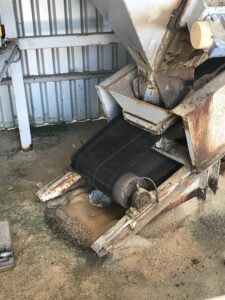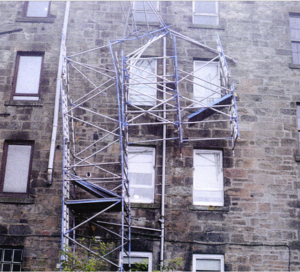Health and Safety Executive (HSE) principal scientist Dr Jackie Morton has received The Royal Society of Chemistry Exceptional Service Award.
Dr Morton, based at HSE’s Science and Research Centre in Buxton, is part of a biological monitoring team whose work involves determining workplace exposures to chemicals. Her area of expertise includes the analyses of toxic elements (such as lead) in biological samples.
She was nominated for the award for her ongoing voluntary commitment to the Royal Society of Chemistry (RSC) Sheffield and District Local Section; and, the RSC Atomic Spectroscopy Group.
Dr Morton is the programme secretary of RSC Sheffield and District Local Section and organises a variety of chemistry themed public events during the year including lectures, school and pub quizzes and school visits. This included a street event in Buxton earlier this year where school children were invited to visit booths and take part in hands on science experiments.
Dr Morton also acts as treasurer for the RSC Atomic Spectroscopy Group a national group of scientists and academics who share information and knowledge to collaborate in the pursuit of science. As part of this group Dr Morton supports younger scientists working in the Atomic Spectroscopy field and helps to organise a biennial conference to bring together national and international researchers.
She was nominated by colleagues from her team at HSE for an outstanding contribution to proactively and inclusively supporting colleagues and the wider scientific community.
After receiving the award, Dr Morton said: “I am honoured to be nominated for this award; my colleagues are very kind.
“I feel that promoting chemistry, locally in Sheffield and nationally in the atomic spectrometry world is important and worthwhile. If one child has been inspired to follow a scientific path, then that is reward enough. The volunteering that I do is always as part of a dedicated team and I thank them all.”
Professor Andrew Curran, HSE’s Chief Scientific Adviser, said: “We are proud of Dr Morton’s lifelong efforts to further the advancement of science.
“She is a valued member of the team whose innovative work is helping to keep employees safe, while her voluntary activities are contributing to new developments through collaboration and inspiring the next generation of scientists.
“As a regulator we value having colleagues who are dedicated to their industry and community and Dr Morton is clearly a fantastic ambassador of science.”
Dr Helen Pain, acting chief executive of the Royal Society of Chemistry said: “We live in an era of tremendous global challenges, with the need for science recognised now more so than ever. It’s incredibly important to recognise those who are making significant contributions behind the scenes towards improving the world we live in as well as inspiring colleagues within the chemical sciences community to do what they can for the people around them.
“This award is about celebrating the efforts of the unsung heroes who go above and beyond to support their colleagues and our wider community. It is for this reason we are proud to be presenting this award to Dr Morton, for her outstanding service to the Royal Society of Chemistry through the activities of the Sheffield and District Local Section and the Atomic Spectroscopy Group.”
The Royal Society of Chemistry’s Exceptional Service Award recognises and celebrates those members who have made a positive impact by contributing through a variety of volunteer positions or over a sustained period of time.
As well as being named winner of the award, Dr Morton also receives a medal.
For further information, see rsc.li/prizes-awards
Of those to have won a Royal Society of Chemistry Award, an illustrious list of 50 have gone on to win Nobel Prizes for their pioneering work, including 2016 Nobel laureates Jean-Pierre Sauvage, Fraser Stoddart and Ben Feringa.
Last year, the Royal Society of Chemistry announced it is reviewing its recognition mechanisms. Details of how the awards structure will be changed – to ensure that the way excellence is recognised is fit for today’s needs – will be announced later this year.
ENDS
Issued by Weber Shandwick on behalf of the Royal Society of Chemistry
For further information please contact:
Morag MacDonald: +44 141 343 3253/ +44 7715 658492/ morag.macdonald@webershandwick.com
Amy Moore: +44 1224 806 604/ +44 7966 321194/ amy.moore@webershandwick.com
NOTES FOR EDITORS:
Rewarding Excellence and Gaining Recognition
The Royal Society of Chemistry’s Prizes and Awards recognise achievements by individuals, teams and organisations in advancing the chemical sciences. We want to reward those undertaking excellent work in the chemical sciences from across the world.
There are over 80 Prizes and Awards in our main portfolio, all of which aim to accurately reflect the broad scope of achievement in our community. So whether you work in research, business, industry or education, recognition is open to everyone.
More information is available at: rsc.li/prizes-awards
Royal Society of Chemistry
We are an international organisation connecting chemical scientists with each other, with other scientists, and with society as a whole. Founded in 1841 and based in London, UK, we have an international membership of over 50,000. We use the surplus from our global publishing and knowledge business to give thousands of chemical scientists the support and resources required to make vital advances in chemical knowledge. We develop, recognise and celebrate professional capabilities, and we bring people together to spark new ideas and new partnerships. We support teachers to inspire future generations of scientists, and we speak up to influence the people making decisions that affect us all. We are a catalyst for the chemistry that enriches our world.
Health and Safety Executive
For further information please contact:
Katie Storey: +44 151 922 1221/ media.enquiries@hse.gov.uk
The Health and Safety Executive (HSE) is Britain’s national regulator for workplace health and safety. We prevent work-related death, injury and ill health through regulatory actions that range from influencing behaviours across whole industry sectors through to targeted interventions on individual businesses. These activities are supported by globally recognised scientific expertise. www.hse.gov.uk
The post HSE SCIENTIST WINS ROYAL SOCIETY OF CHEMISTRY’S EXCEPTIONAL SERVICE AWARD appeared first on HSE Media Centre.
 Chelmsford Magistrates’ Court heard how, on 18 February 2019, an employee was removing sand from the inside of a conveyor belt in an attempt to fix the machine at Slough Lane, Colchester. The employee’s left glove became caught in the in-running nip of the conveyor tail drum, pulling his hand and arm into the machine. The emergency stop button in the building did not work, so a colleague had to run to another building to alert the operator at the control panel to turn the machine off.
Chelmsford Magistrates’ Court heard how, on 18 February 2019, an employee was removing sand from the inside of a conveyor belt in an attempt to fix the machine at Slough Lane, Colchester. The employee’s left glove became caught in the in-running nip of the conveyor tail drum, pulling his hand and arm into the machine. The emergency stop button in the building did not work, so a colleague had to run to another building to alert the operator at the control panel to turn the machine off.